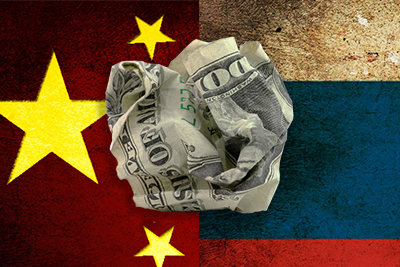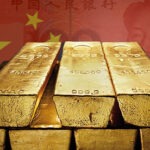 Russia’s conflict with Ukraine has dominated the news recently, but it is Russia’s economic deals that should be garnering more attention. The Kremlin has made it very clear that they are interested in having the U.S. dollar removed as the world’s reserve currency and they have struck a number of trade deals with China and Iran that bypass the U.S. dollar altogether.
Russia’s conflict with Ukraine has dominated the news recently, but it is Russia’s economic deals that should be garnering more attention. The Kremlin has made it very clear that they are interested in having the U.S. dollar removed as the world’s reserve currency and they have struck a number of trade deals with China and Iran that bypass the U.S. dollar altogether.
Last week, Russia held an economic summit in St. Petersburg. CNBC reports that the main focus of the event was to further improve Russia’s trade relationship with China. Moscow’s budding friendship with its neighbor to the east is a major step towards Russia’s plan for the de-dollarization of the world.
This past Friday, Russian President Vladimir Putin, speaking at a CNBC-hosted event, announced his plans for closer ties to China and a new Eurasian union. This statement happened in the aftermath of a $400 billion, 30-year gas deal signed between Russian gas giant Gazprom and China. This deal comes at a critical time for Moscow, since Europe has been making plans to reduce the amount of imported Russian oil following Russia’s actions in Ukraine.
Although details are hard to come by, CNBC reports that most analysts are predicting that the deal would have Chinese yuan being exchanged directly into Russian rubles, completely bypassing the US dollar-backed petrodollar.
There are number of experts expressing concerns that more deals like this could have a negative impact on the value of the U.S. dollar. Jim Rickards, portfolio manager at West Shore Group and partner at Tangent Capital Partners, told CNBC via email that, “Taken alone, these actions do not mean the end of the dollar as the leading global reserve currency. But, taken in the context of many other actions around the world including Saudi Arabia’s frustration with U.S. foreign policy toward Iran, and China’s voracious appetite for gold, these actions are meaningful steps away from the dollar.”
In addition to this oil deal, Russia and China have also been working on an agreement to pay each other in domestic currencies. The deal is between VTB, Russia’s second largest bank, and Bank of China, and signals a strong move ahead for their collective “de-dollarization” movement.
An official from VTB released the following statement, “Under the agreement, the banks plan to develop their partnership in a number of areas, including cooperation on ruble and yuan settlements, investment banking, inter-banking lending, trade finance, and capital markets transactions.”
Russian Prime Minister Dmitry Medvedev followed up on Russian television, stating that any sanctions from the United States or the European Union would lead Russia to start exclusively using the ruble for trade, eventually turning it from a “convertible into a reserve currency.”
While neither of these deals have had a direct impact on the U.S. dollar, analysts are beginning to wonder about what this could mean for the United States economy down the road. The dollar is strengthened by its status as the world’s reserve currency, allowing the U.S. to borrow nearly unlimited amounts of money since there is always a huge demand for its currency. A downgrade in the global status of the dollar would force the United States to stop living beyond its means, which could lead to major government cut backs and possibly multiple defaults.
Rickards also expressed the following opinion in his email to CNBC: “The larger problem is that the U.S. is taking the reserve currency role of the dollar for granted and risks jeopardizing confidence in it through [the Federal Reserve’s] monetary policy and the Treasury’s cheap dollar policy. Confidence in the dollar can persist for now and then be lost as quickly as happened in the late 1970s.”
 China, the largest holder of U.S. debt (Treasuries), appears to have gotten the memo about the danger of the U.S. dollar losing its elevated status. Recently, China has begun to decrease its U.S. Treasury holdings, while at the same time buying gold and euros. In fact, China now rivals India as the world’s largest buyer of physical gold.
China, the largest holder of U.S. debt (Treasuries), appears to have gotten the memo about the danger of the U.S. dollar losing its elevated status. Recently, China has begun to decrease its U.S. Treasury holdings, while at the same time buying gold and euros. In fact, China now rivals India as the world’s largest buyer of physical gold.
Rickards believes that China’s current monetary strategy is creating a hedged position intended to protect the Chinese economy against a devaluation of the U.S. dollar. He said, “As the U.S. devalues the dollar through inflation, China will lose wealth on the dollar position but will profit on the euros and gold and those profits will offset the losses. So, basically, China is constructing a massive hedge using gold.” Rickards goes on to say that he thinks if the dollar lost its reserve currency status that the replacement would come from among “euros, gold, or special drawing rights [SDRs – a supplementary asset maintained by the International Monetary Fund].”
A devaluation of the U.S. dollar due to inflation or its losing the reserve currency role, or any further warning signs, could lead to a big jump in physical gold prices as investors flock to the yellow metal as a hedge.


